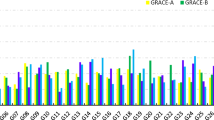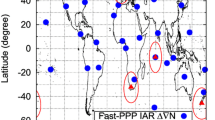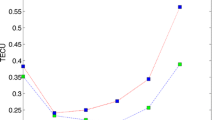Abstract
With the increased number of low Earth orbit (LEO) satellites equipped with Global Positioning System (GPS) receiver, the LEO based GPS slant total electron content (STEC) data play a more important role in ionospheric research due to better global coverage. The accuracy of LEO TEC is hardly evaluated by comparison with the independent TEC measurement simultaneously. We propose an approach based on the simulated data to verify the accuracy of TEC determination. The simulated data (i.e., the pseudorange and carrier phase observations) was generated based on the consideration of the effect of the ionosphere, the so-called differential code bias (DCB) and observational noise. The errors of carrier phase to code leveling process and DCB estimation are analyzed quantitatively. Also, the effect of observational noise, solar activity and LEO orbit altitude on the accuracy of TEC determination will be discussed in detail. The accuracy of TEC determination is relative to solar activity and LEO orbit altitude, the higher LEO orbit and lower F10.7 index, the higher accuracy of TEC determination. It is found by the first time that, with the amplification of the pseudorange noise, the accuracy of leveling process and TEC determination declines almost linearly. With the LEO missions in the near future, it is hoped that the GPS satellite DCBs estimated based on LEO observations would be better than those based on ground-based observations.







Similar content being viewed by others
References
Anthes, R.A.: Exploring Earth’s atmosphere with radio occultation: contributions to weather, climate and space weather. Atmos. Meas. Tech. 4(6), 135–212 (2011). https://doi.org/10.5194/amtd-4-135-2011
Blewitt, G.: An automatic editing algorithm for GPS data. Geophys. Res. Lett. 17, 199–202 (1990). https://doi.org/10.1029/GL017i003p00199
Braasch, M.: Multi-path effects. In: Parkinson, B.W., Spilker, J.J. (eds.) Global Positioning System: Theory and Applications. Progress in Astronautics and Aeronautics, American Institute of Aeronautics and Astronautics, vol. 1, pp. 547–568 (1996)
Brunini, C., Azpilicueta, F.: GPS slant total electron content accuracy using the single layer model under different geomagnetic regions and ionospheric conditions. J. Geod. 84(5), 293–304 (2010). https://doi.org/10.1007/s00190-010-0367-5
Cesaroni, C., Spogli, L., Alfonsi, L., De Franceschi, G., Ciraolo, L., Monico, J.F.G., Scotto, C., Romano, V., Aquino, M., Bougard, B.: L-band scintillations and calibrated total electron content gradients over Brazil during the last solar maximum. J. Space Weather Space Clim. 5, A36 (2015). https://doi.org/10.1051/swsc/2015038
Choi, B.K., Cho, J.H., Lee, S.J.: Estimation and analysis of GPS receiver differential code biases using KGN in Korean Peninsula. Adv. Space Res. 47(9), 1590–1599 (2011)
Ciraolo, L., Azpilicueta, F., Brunini, C., Meza, A., Radicella, S.M.: Calibration errors on experimental slant total electron content (TEC) determined with GPS. J. Geod. 81(2), 111–120 (2007). https://doi.org/10.1007/s00190-006-0093-1
Conte, J.F., Azpilicueta, F., Brunini, C.: Accuracy assessment of the GPS-TEC calibration constants by means of a simulation technique. J. Geod. 85(10), 707–714 (2011). https://doi.org/10.1007/s00190-011-0477-8
Foelsche, U., Kirchengast, G.: A simple “geometric” mapping function for the hydrostatic delay at ratio frequencies and assessment of its performance. Geophys. Res. Lett. 29(10) (2002). https://doi.org/10.1029/2001Gl013744
Fuying, Z., Yun, W.: Anomalous variations in ionospheric TEC prior to the 2011 Japan Ms9. 0 earthquake. Geod. Geodyn. 2(3), 8–11 (2011). https://doi.org/10.3724/SP.J.1246.2011.00008
Jian, Y., Yiyan, Z., Fanfan, S.: Ionospheric anomaly before the 2011 Tohoku Mw 9.0 earthquake. Geod. Geodyn. 3(3), 7–22 (2013). https://doi.org/10.3724/SP.J.1246.2012.00017
Komjathy, A., Wilson, B., Pi, X., Akopian, V., Dumett, M., Iijima, B., Verkhoglyadova, O., Mannucci, A.J.: JPL/USC GAIM: on the impact of using COSMIC and ground-based GPS mea-surements to estimate ionospheric parameters. J. Geophys. Res. 115, A02307 (2010). https://doi.org/10.1029/2009JA014420
Li, Z., Yuan, Y., Li, H., Ou, J., Huo, X.: Two-step method for the determination of the differential code biases of COMPASS satellites. J. Geod. 86(11), 1059–1076 (2012). https://doi.org/10.1007/s00190-012-0565-4
Lin, J., Wu, Y.: Abel ionospheric inversion technique and itserror analysis. Chin. J. Geophys. 56(4), 1070–1076 (2013). https://doi.org/10.6038/cjg20130402 (in Chinese)
Lin, J., Xiong, J., Zhu, F.Y., Yang, J., Qiao, X.J.: An ionospheric occultation inversion technique based on epoch difference. J. Atmos. Sol.-Terr. Phys. 102(2013), 192–197 (2013)
Lin, J., Yue, X., Zhao, S.: Estimation and analysis of GPS satellite DCB based on LEO observations. GPS Solut. 20(2), 251–258 (2016). https://doi.org/10.1007/s10291-014-0433-1
Ma, G., Maruyama, T.: Derivation of TEC and estimation of instrumental biases from GEONET in Japan. Ann. Geophys. 21(10), 2083–2093 (2003). https://doi.org/10.5194/angeo-21-2083-2003
Mendillo, M., Schatten, K.: Influence of solar sector boundaries on ionospheric variability. J. Geophys. Res. 88(A11), 9145–9153 (1983). https://doi.org/10.1029/JA088iA11p09145
Montenbruck, O., Kroes, R.: In-flight performance analysis of the CHAMP BlackJack GPS receiver. GPS Solut. 7(2), 74–86 (2003). https://doi.org/10.1007/s10291-003-0055-5
Rishbeth, H., Mendillo, M.: F2-layer variability. J. Atmos. Sol.-Terr. Phys. 63(15), 1661–1680 (2001)
Schreiner, W.S., Sokolovskiy, S.V., Rocken, C., Hunt, D.C.: Analysis and validation of GPS/MET radio occultation data in the ionosphere. Radio Sci. 34(4), 949–966 (1999). https://doi.org/10.1029/1999RS900034
Sekido, M., Kondo, T., Kawai, E., Imae, M.: Evaluation of global ionosphere TEC by comparison with VLBI data. In: International VLBI Service for Geodesy and Astrometry 2004 General Meeting Proceedings, NASA/CP-2004-212255, pp. 427–436 (2004)
Yue, X., Schreiner, W.S., Lin, Y.-C., Rocken, C., Kuo, Y.-H., Zhao, B.: Data assimilation retrieval of electron density profiles from radio occultation measurements. J. Geophys. Res. 116, A03317 (2011a). https://doi.org/10.1029/2010JA015980
Yue, X., Schreiner, W.S., Hunt, D.C., Rocken, C., Kuo, Y.-H.: Quantitative evaluation of the low Earth orbit satellite based slant total electron content determination. Space Weather 9, S09001 (2011b). https://doi.org/10.1029/2011SW000687
Yue, X., Schreiner, W.S., Kuo, Y.-H., Hunt, D.C., Wang, W., Solomon, S., Burns, A., Bilitza, D., Liu, J.Y., Wan, W., Wickert, J.: Global 3-D ionospheric electron density reanalysis based on multisource data assimilation. J. Geophys. Res. 117, A09325 (2012). https://doi.org/10.1029/2012JA017968
Zhang, W., Zhang, D.H., Xiao, Z.: The influence of geomagnetic storms on the estimation of GPS instrumental biases. Ann. Geophys. 27(4), 1613–1623 (2009). https://doi.org/10.5194/angeo-27-1613
Zhang, D., Zhang, W., Li, Q., Shi, L.Q., Hao, Y.Q., Xiao, Z.: Accuracy analysis of the GPS instrumental bias estimated from observations in middle and low latitudes. Ann. Geophys. 28(8), 1571–1580 (2010). https://doi.org/10.5194/angeo-28-1571-2010
Acknowledgements
This material is based upon work supported by Spark Program from China Earthquake Administration (No. XH18032), China Natural Science Funds (No. 41874070), Scientific Research Fund of Institute of Seismology and Institute of Crustal Dynamics, China Earthquake Administration (No. IS201716161).




